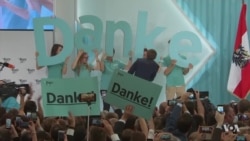Europe looks set to have its youngest leader with Austria's 31-year-old Sebastian Kurz of the conservative People’s Party scoring a clear victory in Sunday's parliamentary election, winning around 32% of the votes cast.
Kurz, who took the reins of the party earlier this year, told his jubilant supporters that “The Austrian population gave us their confidence to bring about a new style of political culture and for a respectful relation to the other parties, and most importantly to advance Austria forward.”
His victory marks an extraordinarily rapid rise to the top of Austrian politics. Kurz transformed the fortunes of his People’s Party, largely on an anti-migrant platform.
On the campaign trail earlier this month, he promised supporters that he would “strike a very clear path which is going to reduce illegal migration to zero,” adding that migrants who “set off illegally must be stopped at the border, taken care of and sent back.”
Elections in France and the Netherlands this year checked the momentum of right-wing populist parties in Europe. But Austria has shown it is still a political force, says Leopold Traugott of the analyst group Open Europe.
“Right wing populism certainly is not dead in Europe, particularly not in Austria. Austria was one of the main reception countries, but also transit countries during the refugee crisis in 2015. And still during this election campaign it was the meta-topic to which all other issues were combined.”
Kurz’s rival, Heinz-Christian Strache – leader of the far-right Freedom Party – accuses Kurz of stealing his policies and political slogans on migration and Islam.
“Now we will see if they really mean it honestly or seriously, if they are even willing to have honest negotiations with us or not. And I'm telling you: you can rely on one thing. We are going to stay true to ourselves,” Strache told supporters Sunday as it became clear his party had sealed second place.
Coalition talks
With all parties well short of a majority, tough coalition talks lie ahead. Analysts say a coalition agreement between the People’s Party and the Freedom Party is now the most likely outcome of the election – although other combinations are possible. The third-placed Social Democrats, hurt by scandals during the campaign, have not ruled out forming a coalition with either of the two right-wing parties.
It’s clear Kurz’s People’s Party tried to offset the challenge of the far right by taking a tough line on immigration, says Traugott.
“The question of how you can actually beat the populists is debated all over Europe. And at least in Austria, moving towards them certainly did not help.”
In Austria, as in other parts of Europe, analysts say voters express the same common concerns.
“In general globalization, digitalization, economic crisis, people are more and more insecure, people lose their jobs and even or especially less educated people have kind of a feeling that they can't keep up with modern times, a modern labor market and so on,” says Alexandra Siegl, a polling analyst at the Vienna-based Peter Hajek Strategies, a political consultancy firm.
Those same concerns were echoed in the French presidential election, won by another young leader who stormed the established political order – Emmanuel Macron. Analysts say the similarities end there.
“While Macron is a cosmopolitan, a globalist as he calls himself, Sebastian Kurz clearly portrays a more conservative, traditionalist image,” says Traugott.
They are contrasting visions within the new generation of European political leaders. For the EU itself, analysts say the result in Austria will dampen hopes that 2016 – the year of Brexit - marked the beginning of the end of the right-wing populist surge.










